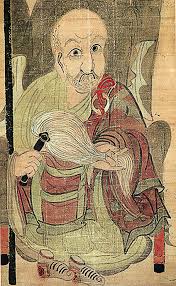Gudo was the emperor's teacher of his time. Nevertheless, he used to travel alone as a wandering mendicant. Once when he was on his way to Edo, the cultural and political center of the shogunate, he approached a little village named Takenaka. It was evening and a heavy rain was falling. Gudo was thoroughly wet. His straw sandals were in pieces. At a farmhouse near the village he noticed four or five pairs of sandals in the window and decided to buy some dry ones. The woman who offered him the sandals, seeing how wet he was, invited him in to remain for the night in her home. Gudo accepted, thanking her. He entered and recited a sutra before the family shrine. He was then introduced to the women's mother, and to her children. Observing that the entire family was depressed, Gudo asked what was wrong.
"My husband is a gambler and a drunkard," the housewife told him. "When he happens to win he drinks and becomes abusive. When he loses he borrows money from others. Sometimes when he becomes thoroughly drunk he does not come home at all. What can I do?"
"I will help him," said Gudo. "Here is some money. Get me a gallon of fine wine and something good to eat. Then you may retire. I will meditate before the shrine."
When the man of the house returned about midnight, quite drunk, he bellowed: "Hey, wife, I am home. Have you something for me to eat?"
"I have something for you," said Gudo. "I happened to be caught in the rain and your wife kindly asked me to remain here for the night. In return I have bought some wine and fish, so you might as well have them."The man was delighted. He drank the wine at once and laid himself down on the floor. Gudo sat in meditation beside him.
In the morning when the husband awoke he had forgotten about the previous night. "Who are you? Where do you come from?" he asked Gudo, who was still meditating.
"I am Gudo of Kyoto and I am going on to Edo," replied the Zen master.
The man was utterly ashamed. He apologized profusely to the teacher of his emperor.
Gudo smiled. "Everything in this life is impermanent," he explained. "Life is very brief. If you keep on gambling and drinking, you will have no time left to accomplish anything else, and you will cause your family to suffer too."
The perception of the husband awoke as if from a dream. "You are right," he declared. "How can I ever repay you for this wonderful teaching! Let me see you off and carry your things a little way."
"If you wish," assented Gudo.
The two started out. After they had gone three miles Gudo told him to return. "Just another five miles," he begged Gudo. They continued on.
"You may return now," suggested Gudo."After another ten miles," the man replied.
"Return now," said Gudo, when the ten miles had been passed.
"I am going to follow you all the rest of my life," declared the man.
Modern Zen teachings in Japan spring from the lineage of a famous master who was the successor of Gudo. His name was Mu-nan, the man who never turned back.
COMMENT: When you find the right path, stay on it.






























